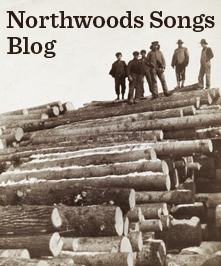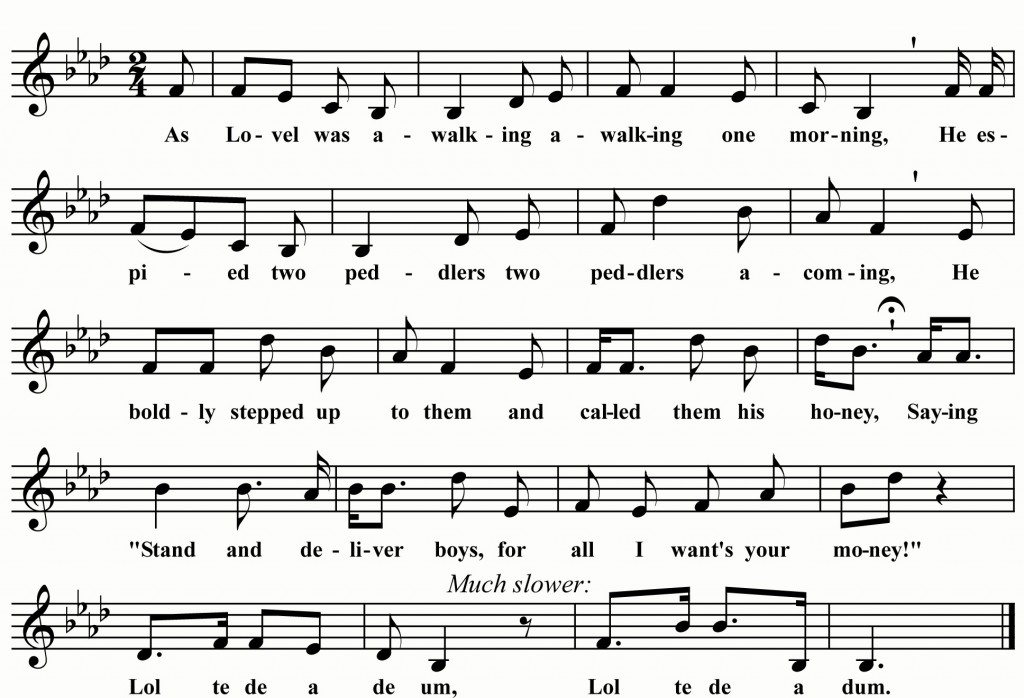Lovel (Laws L13B)

As Lovel was walking a walking one morning
He espied two pedlers two pedlers a coming
He boldley stept up to them and called them his honey
Saying stand and deliver boys for all I wants your money.
Lol te de a de um, Lol te de a dum.
O we are two pedlers two pedlers are we sir
And you are Mr. Lovel we take you to be sir
O we are two pedlers that have lateley cam from dublin
And all that we have in our box is our bedin and our clothing.
As Lovel was walking up kinsberry mountain
He espied two rich misers their guines they were counting
First he cocked his blunderbus and then he drew his rapier
Saying stand and deliver boys for I’me a money taker.
O Lovel O Lovel my poor harts a breaking
For little did I think my love you ever would ben taken
And if I had ave knawn that the enemy was a coming
Ide have fought like a hero although Ime but a woman.
O Polly O Polly my poor harts a breaking
If it had not been for you my love I never would been taken
For while I was a sleeping not thinking of the matter
You discharged my pistols and loded them with water.
As Lovel was walking all up the galos lader
He called to the sherif for his irish cap and fether
Saying I have robed money but never killed enny
I think it hard that I must die just for grabing money.
__________________________________
From 1923 through 1927, folklorist and song collector Robert Winslow Gordon edited a column in the pulp magazine Adventure called “Old Songs That Men Have Sung.” Each column included folksong texts sent in by readers from their own memories, personal song notebooks and singing friends and family members. Gordon received over 3000 letters from readers, many in search of words to half-remembered songs and many contributing songs themselves.
During my trip to the American Folklife Center this past June I was able to sift through these letters and Gordon’s typed responses to them – all of which are in the AFC’s amazing archive. Going through the letters (the AFC staff allowed me to work with the brittle originals!) gave me insight into the lives and motivations of singers from that era. Many writers lamented the changing times and the loss of the traditional singing cultures they grew up with.
The words to this version of “Lovel” appear in a set of songs sent in to Gordon in 1924 by singer Reuben Waitstell Phillips of Akeley, Minnesota (see N.S. Oct. 2013). Phillips’ accompanying letter began:
Dear Sir,
I am an old man and my hand shakes so that I am compeled to use a pencil insted of pen and ink but I am going to send you a few old songs that men have sung if you can use them well and good if not why just a little time spent.
Gordon was delighted by the 22 song texts sent in by Phillips and he chose “Lovel” to print in his next “Old Songs” column. He introduced the column saying:
A MOST valuable contribution arrived last week from Mr. R. W. Phillips of Akeley, Minnesota—a forty-six-page manuscript of twenty-two songs, every one of them worth while! I have sent Mr.Phillips, in your name and mine, our heartiest thanks. May his voice be heard often!
Above, I have given the text as Phillips supplied it, complete with unconventional spellings. The transcription is my own based on a wax cylinder recording made by Gordon of Phillips during a visit to Akeley (from what I can tell in researching the family, the Phillipses lived south of Akeley near Chamberlain, MN) the same year he received the letter.
The song is a distant variant of “Whiskey in the Jar.” Similar versions were collected in Vermont and Maine but Phillips’ melody is quite unique… and fun to sing!
More on this song and its more well-known variant “Whiskey in the Jar” here.

